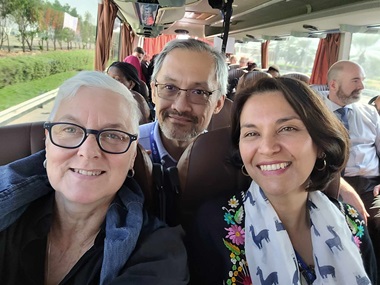
Deb Walker (left) and Samuel Chiu (both from Vancouver) and Alejandra Guajardo (from Lima, Peru), all members of the Christian Climate Observers Program (CCOP) team.
A local minister who took part in COP 28 (the 28th United Nations Climate Change Conference) has mixed feeling about the results.
Deborah Walker, Minister of Connection and Social Justice at Shaughnessy Heights United Church, spent about a week as part of the Christian Climate Observers Program (CCOP) team at Dubai, in the United Arab Emirates (UAE).
Although she returned shortly before COP 28 concluded, she has continued to keep a close eye on the gathering.
This is how BBC News described the final agreement December 13; tense overnight discussions had extended the gathering past its original December 12 end date:
Nations at the UN climate summit have for the first time taken explicit aim at the use of fossil fuels. The talks in Dubai came close to collapse but in a dramatic turn-around, nations agreed to “transition away” from coal, oil and gas.
But small islands hit hard by climate change protested, saying the deal was rushed through without them. And it departed from earlier stronger language to “phase out fossil fuels.”
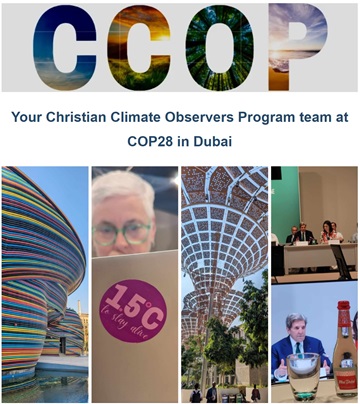
Deborah Walker wrote the Day 6 CCOP comment.
Walker emailed the morning of the agreement:
The work that took negotiators through the night, has some positive attributes to be sure, but still represents a wide gap between the will of the delegates from around the world, and what the countries negotiating are able to come up with.
All week there was a heavy and persistent voice demanding the phase out of fossil fuels, of just transition and the fully funded Adaptation and Mitigation programs, especially for Africa and Global south islands.
CCOP observers offered daily reflections on COP 28; Walker included this comment about transition as part of her Day 6 offering:
Transition is such a curious word – it brings to my mind . . . change, a revelation, something wonderful and perhaps a bit of surprise. ‘Just Transition’ is one of the many buzzwords that floats around in the multitude of conversations that are happening everywhere.
A Just Transition involves maximizing the social and economic opportunities of climate action, while minimizing and carefully managing any challenges – including through effective social dialogue among all groups impacted, and respect for fundamental labour principles and rights.
Walker actually shared the day’s reflections with well known author Eugene Cho, though he wrote mainly the prayer suggestions accompanying her comment.
Faith leader
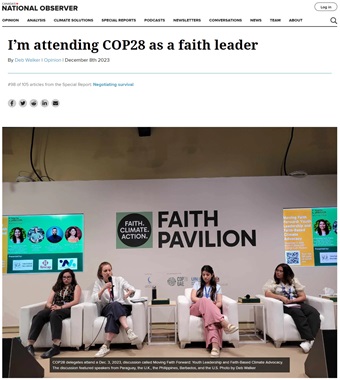 In an opinion piece posted December 8 on Canada’s National Observer, Walker explained her participation in COP 28:
In an opinion piece posted December 8 on Canada’s National Observer, Walker explained her participation in COP 28:
The Church is the perfect body of stubborn, hopeful humans. As a minister in the United Church of Canada, I serve a faithful, struggling congregation in Vancouver. We are struggling because the world has already been changed, and the church with it.
We struggle with the stains of our history: the participation in residential schools and the Sixties Scoop. Yet, here we are at the crossroads of our reconciliation work and climate justice. And this time, we are poised to make a difference.
For the first time in the history of the UN’s climate summits, there is a faith pavilion in the heart of the Blue Zone, where meetings and negotiations take place.
And for the first time, this meeting of the parties is hosted by a Muslim nation in a venue that declares we submit to a higher power, where we will stand shoulder to shoulder, listening to stories of transformation and hearing from communities that are bending towards healing and hope. But this is also a place where the fossil fuel industry holds great power and is continuously looking to lock down business deals.
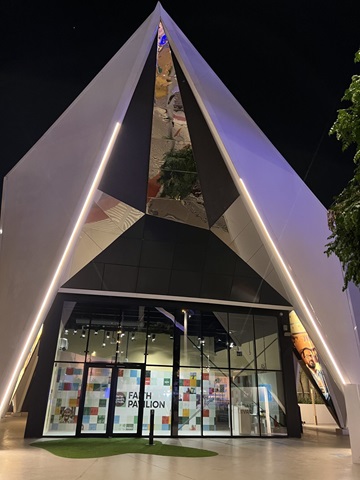
The Faith Pavilion featured 325 speakers at 65 sessions, representing 54 nations and many faith groups.
I am a minister who is not an expert on climate science. But this is why it matters that I am here. I am in Dubai to witness, to watch governments and industry lobbyists try to convince the world that it is still OK to pollute our only habitat, chop down the last old-growth forests, and destroy the dreams of our grandchildren. I am here to watch and not look away when the truth is ugly and demanding.
I am here because faith leaders have an important role to play in the environmental movement and the future of climate justice – we have circles of influence, we work with communities that value beauty, that care deeply for others, and we are people who believe in reciprocity across the generations.
Our faith perspective and the congregations that we serve are filled with folks just like you and me, seeking to live in meaningful ways that contribute to the well-being of the Earth. We live for a future that is abundant and sustainable and will be a gracious legacy for all who follow us – inside and outside the Church.
Go here for the full comment.
Faith Pavilion
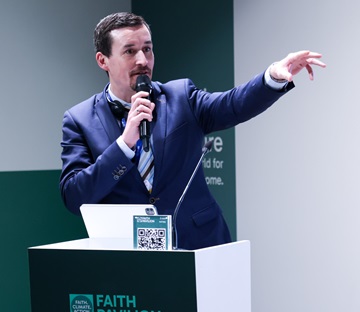
Matthias Boehning, Director of the WEA’s Sustainability Centre, moderated the full-day program at the Faith Pavilion December 3.
The UN Environment Program recognized Faith-based Engagement at COP 28 on its site:
Faith-based organizations (FBOs) and religious leaders are an important presence at the UN Framework Convention on Climate Change (UNFCCC) Conference of Parties demonstrating that religious and spiritual communities are essential to the fight against climate change and to achieving the Sustainable Development Goals (SDGs) and the goals of the Paris Agreement.
The core team involved six partners, including the World Evangelical Alliance (WEA), which posted December 5:
The pavilion is a collaboration between the COP28 Presidency, the United Arab Emirates Ministry of Tolerance and Coexistence and the United Nations Environment Programme.
The main organiser is the Muslim Council of Elders. The WEA Sustainability Center (WEASC) is one of the co-hosts and co-organisers of the Faith Pavilion. Over the past 12 months, the WEASC has worked intensively on the preparation and programme planning for the Faith Pavilion.
(December 16 note: Chris Elisara, co-director of the WEASC, reflected on COP 28 here.)
Go here for the really varied Faith Pavilion schedule; 325 speakers at 65 sessions represented 54 nations and many faith groups throughout COP 28.
The World Council of Churches also took an active part in COP 28; go here for links to several articles.
Samuel Chiu / CCOP
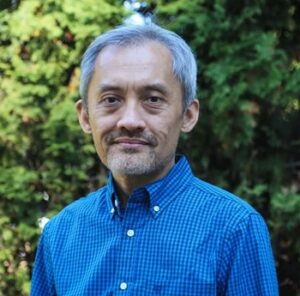
Samuel Chiu is a veteran of several COP gatherings.
Also attending COP 28 was Samuel Chiu, who lives in Metro Vancouver and works with both A Rocha Canada (based in south Surrey) and A Rocha International. He is in a leadership role with the CCOP, which had 40 participants and leaders from 10 countries registered as observers in Dubai. Four were from Canada.
The Christian Climate Observers Program (CCOP) is:
. . . a nondenominational Christian presence advocating for God’s creation at the COP28 climate summit. . . . We are training the next generation of UN climate observers from a Christian and missional perspective.
Members of CCOP include A Rocha Canada, A Rocha International, Lausanne / World Evangelical Alliance Creation Care Network, Eden Vigil and Young Evangelicals for Climate Action.
Looking ahead
Deborah Walker expressed some hopes for the future following the December 13 agreement:
The Loss and Damage fund being agreed upon on the first day was either a stroke of genius or a massive manipulation play. Adaptation and Mitigation are much less expensive than Loss and Damage estimates of what could lie ahead if we exceed the 1.5C target for global warming.
The developed nations – most of whom are still producing oil and gas – must move first and must move the fastest to support the work of Just Transitions to renewables and new energy technologies.
The week was filled with meaningful engagement, inspiring connections and a deep belief that this planet and all her inhabitants are worth the effort. I pray that Canada adopts a more significant leadership role in moving forward. The significance of COP 28 will depend entirely on financing.
COP 29 will be held in Azerbaijan, after what The Guardian described as “fraught negotiations.” Azerbaijan, like the United Arab Emirates, is heavily dependent on fossil fuel. As well, it has a poor record on human rights and just earlier this year violently took over Artsakh, an enclave of ethnic Armenians claiming independence.
Closing thoughts
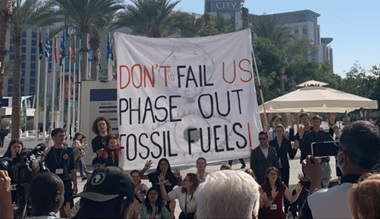
From the CCOP update on the last day of COP 28: a demonstration in the Blue Zone. Photo: Bryan Bishop
The CCOP’s daily update for December 12 concluded with this:
Marie South, who works with SIL, an organization which serves speakers of non-dominant languages, wrote a lament expressing some of these feelings. She took inspiration from Habakkuk 3 and John 16:33.
Here is the lament as our closing thoughts to you.
Lord we lament
We lament the greed and injustice which destroys forests, poisons streams, and pollutes the air
We lament the false wisdom that separates man from the environment as if one can thrive without the other
Lord we lament
We lament the self-interest and fear of loss that leads to profit being prioritized over people
We lament the tragedy of islands disappearing into the ocean, whilst oligarchs swim in wealth
Lord we lament
We lament the damage to our youth, and the lack of a hopeful message for our grandchildren
We lament the suffering of the old who watch their ancestral way of life slip through their fingers
Lord we lament
We lament with those for whom the fig tree does not bud, and there are no grapes on the vines
We lament with those for whom the olive crop fails and the fields produce no food
We lament with those for whom there are no sheep in the pen and no cattle in the stalls
And yet, we will rejoice in the Lord, we will be joyful in God our Savior.
We will rejoice in young believers, hearing God’s call to rise up, and obediently standing on your promises
We will rejoice that Jesus is Lord, and not the oil chiefs or the coal merchants
We will rejoice that Jesus died for his enemies, and so can teach us how to love our enemies
We will rejoice because although in this world we have trouble, you have overcome the world.
